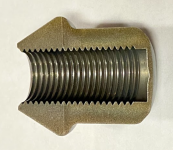Just curious - how many miles are on your car?My car started doing the same thing this week during a track day at Area 27 , I also have titanium lug nuts .
Wheel creaking issue
- Thread starter Special K
- Start date
You are using an out of date browser. It may not display this or other websites correctly.
You should upgrade or use an alternative browser.
You should upgrade or use an alternative browser.
Special K,
The contact band in the photo is low on the seat compared to what we typically see after torque tension testing. We have equipment that measures torque/tension as many OEMs have a tension range that must be met over a number of cycles (typically 10, sometimes 20) at a specified torque.
Derry
The contact band in the photo is low on the seat compared to what we typically see after torque tension testing. We have equipment that measures torque/tension as many OEMs have a tension range that must be met over a number of cycles (typically 10, sometimes 20) at a specified torque.
Derry
Unfortunately, my car is being loaded this week to head home with no further corrective action. I’m confident this will eventually be resolved with more cars exhibiting the issue, sadly my year long ordeal may have been in vain.
Last edited:
sahlman
Ford GT Team Alumni
150 ft-lbs
Agreed on all...especially your question on their target bolt load (tension). What diameter is the stud? That is a very high lug nut torque. Typical is 90 to 100 ft lbs. If the joint is correct they will not loosen once torqued...unless the torque is actually yielding the stud, the nut or the wheel.Well, tough to misinterpret that. Moly dry lubes from what I know though can have different particle sizes and chemistry so I was just surprised they are not more specific. Ti does not yield like steel does so the 'stretch' of the joint that gives the tension is a bit different than with a steel nut. The metal insert in the CF wheel may be steel which would also give different torque tension relationship to the joint as opposed to an aluminum seat machined into an aluminum wheel. It would be interesting to know the target tension they are trying for at a torque of 150 ft. lbs. but I assume it is the same target as the steel un-lubed nut on an aluminum seat.
Also, we very explicitly designed, tested and never allowed lubricants on our fastened chassis joints (not any) at Ford when I was there. I don't understand what happened on this design.
I’m interested in seeing if any explicit instructions regarding lubricant specs and application show up with my car upon delivery and to servicing dealers. As of now, there is none other than what I’ve shared.Agreed on all...especially your question on their target bolt load (tension). What diameter is the stud? That is a very high lug nut torque. Typical is 90 to 100 ft lbs. If the joint is correct they will not loosen once torqued...unless the torque is actually yielding the stud, the nut or the wheel.
Also, we very explicitly designed, tested and never allowed lubricants on our fastened chassis joints (not any) at Ford when I was there. I don't understand what happened on this design.
sahlman
Ford GT Team Alumni
OK, thank you. Standard. Do you guys see many lug nut torques over 100 ft-lbs? 150 ft-lbs seems very high.Stud is 14MM.
The Grey Ghost
GT Owner
sahlman
Ford GT Team Alumni
Huh, my R8 wheel bolts (not studs) are 14 mm and the Audi torque is 90 ft-lb with the stock forged aluminum wheels. I check the torque often and run at the track with significant heat cycles and they never back off at all. I don't understand what has happened on the Ford lug joint design.I think the studs on my F-350 are 14mm and I believe the torque is 140.
12mm is usually in the 100 range.
Thanks Special Ed, I really think the issue lies solely on the Ti nuts. I should have the car back in a couple of weeks. I’ll keep y’all posted.Try aftermarket wheels & new lug nuts. What an ordeal. Hang in there.
Ed
I’ve seen a video of another car built closely behind mine, it is making a racket. Fortunately, it is so bad that it will be hard to brush off.Huh, my R8 wheel bolts (not studs) are 14 mm and the Audi torque is 90 ft-lb with the stock forged aluminum wheels. I check the torque often and run at the track with significant heat cycles and they never back off at all. I don't understand what has happened on the Ford lug joint design.
Thank you for checking this. I really think the issue is either the dissimilar metals or the internal machining of the Ti lug nut. We talked about cutting one open longitudinally to measure thread pitch, depth and taper.14MM x 1.5.
FWIW I had a Ford TI nut here and checked it over. All within spec. Cone seat was 60.27 degrees.
Obviously it was not your nut Special K and the seat on the wheel will also dictate where the contact band is.
While this issue doesn't concern my car, thank you Derry for your all your input.


